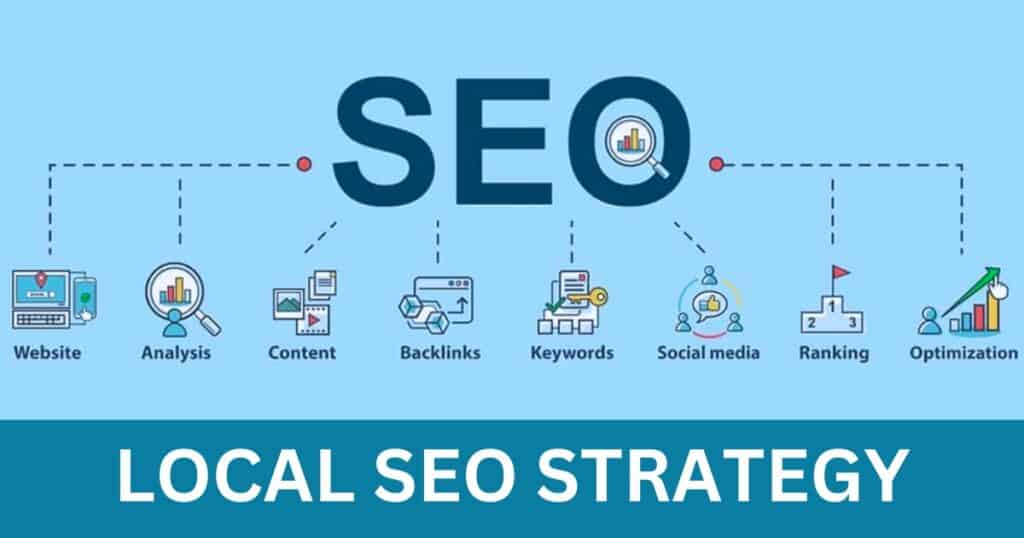Creating a winning local SEO strategy involves multiple steps designed to optimize your online presence so local customers can find you easily. Here’s a step-by-step guide on how you can create a local SEO strategy for your business:

- Google My Business: Register your business with Google My Business. This is a crucial step for local SEO as it allows your business to appear in local search results and on Google Maps. Fill in every detail including business hours, address, phone number, website, etc. Regularly update your listing with new photos, posts, and respond to reviews.
- Keyword Research: Find out what keywords your local customers use when searching for your products or services. Tools like Google Keyword Planner or SEMrush can be helpful. Be sure to include local keywords such as the name of your city or nearby landmarks.
- On-page SEO: Optimize your website content and metadata with your local keywords. This includes title tags, meta descriptions, headers, and content. It’s also important to have a contact page with your business name, address, and phone number (NAP information).
- Local Business Directories: List your business in local online directories like Yelp, Bing Places, Yahoo Small Business, etc. Make sure that your NAP information is consistent across all directories. This consistency helps search engines validate your business’s location and improve your ranking in local search results.
- Reviews and Ratings: Encourage your customers to leave reviews on Google and other directories. Respond to both positive and negative reviews in a professional manner. Reviews are a ranking factor for local SEO and can impact your visibility in local search results.
- Mobile Optimization: Many local searches come from mobile devices. Make sure your website is mobile-friendly. Google’s Mobile-Friendly Test tool can help you check this.
- Local Link Building: Collaborate with local influencers, bloggers, or businesses that can link to your website. Local links can significantly boost your local search rankings.
- Structured Data Markup: Implement structured data (Schema.org) to help search engines understand your business better. This can help improve your visibility in local search results.
- Track Your Results: Use tools like Google Analytics and Google Search Console to monitor your local SEO performance. Look at metrics such as organic traffic, local search rankings, and conversions to assess your strategy and make necessary adjustments.
Remember, local SEO is a long-term investment. It can take several months to see substantial improvement in your local search rankings. However, by consistently applying these strategies, your local visibility will increase, bringing more customers to your business.
Does Your Business Need a Local SEO Strategy?
Whether your business needs a local SEO strategy depends on the nature of your business and its target audience.
Here are a few scenarios where having a local SEO strategy would be beneficial:
- You Have a Brick-and-Mortar Store**: If you operate a physical store or office, a local SEO strategy can make it easier for potential customers in your area to find you online.
- You Serve a Specific Geographic Area: Even if you don’t have a physical location if your service area is limited to a certain city or region (like a plumber or electrician), local SEO can help you reach customers in your service area.
- Your Business Relies on Foot Traffic: Businesses like restaurants, bars, and coffee shops heavily rely on local customers. Local SEO can help these types of businesses increase their visibility to potential customers in the immediate area.
- You’re in a Highly Competitive Industry: If you’re in an industry where there’s a lot of competition, local SEO can give you an edge over competitors who aren’t optimizing for local search.
- You Want to Improve Local Reputation: Reviews on Google My Business and other local platforms can significantly impact your reputation. A good local SEO strategy includes monitoring and responding to reviews, which can help improve customer perception of your business.
However, if your business operates entirely online and serves a global or non-geographically bound audience, a local SEO strategy might not be as critical. You’d likely be better off focusing on broader SEO strategies.
In general, for any business with a local presence or targeting a geographically defined audience, a local SEO strategy is a powerful tool that can improve visibility, drive more foot traffic, and boost conversions.
Types of Businesses That Need Local SEO
Local SEO is particularly valuable for businesses that have a physical location or serve a specific geographic area. Here are some types of businesses that can greatly benefit from implementing a local SEO strategy:
- Restaurants and Cafes: These businesses heavily rely on local foot traffic. Local SEO can help them appear in search results when people in their area are looking for places to eat or get a coffee.
- Retail Stores: Whether it’s a clothing store, a bookstore, or a hardware shop, retail stores can use local SEO to attract more customers to their physical location.
- Service Area Businesses: These are businesses that serve customers at their location, such as plumbers, electricians, home repair services, cleaning services, landscaping companies, etc. They can use local SEO to reach customers in the specific areas they serve.
- Healthcare Services: Doctors, dentists, physical therapists, and other healthcare professionals can use local SEO to make their practices more visible to potential patients in their area.
- Legal Services: Law firms and attorneys can use local SEO to attract potential clients in their geographic area.
- Real Estate Agents: Real estate agents often serve a specific city or region. They can use local SEO to connect with potential home buyers or sellers in their area.
- Fitness Centers and Gyms: Local SEO can help these businesses attract people who are looking for a gym or a fitness center in their area.
- Local Entertainment Venues: Movie theatres, concert venues, and other local entertainment spots can use local SEO to attract people looking for things to do in their area.
- Automotive Services: Car dealerships, auto repair shops, and car rental companies can also benefit from local SEO.
- Educational Institutions: Schools, colleges, and training centers can use local SEO to increase their visibility among prospective students in the local area.
Remember, while these business types can particularly benefit from local SEO, any business with a physical location or that serves customers within a specific geographic area can benefit from optimizing for local search.
Benefits of Local SEO
Local SEO is an effective way to market your local business online and offers numerous benefits:
- Increased Visibility: Local SEO helps your business appear in local search results, increasing your visibility to potential customers in your area.
- Targeted Traffic: Local SEO helps you reach potential customers who are located in your area and who are likely more interested in your products or services. This targeting can lead to higher conversion rates.
- Increased Web Traffic: By optimizing your website for local search, you’re likely to get more web traffic from people who are in your geographic area.
- Competitive Advantage: If your competitors aren’t optimizing for local search, you’ll have an advantage over them in terms of visibility and potentially gaining more customers.
- Reputation Management: Local SEO involves managing your online reputation, including monitoring and responding to reviews. This can help you improve your business’s reputation in the community.
- Cost-Effective Marketing: Compared to other forms of advertising, local SEO can be a cost-effective way to reach potential customers. It’s an inbound marketing strategy, which means you’re reaching people when they’re already looking for businesses like yours.
- Increased Foot Traffic and Sales: By making your business more visible online, local SEO can lead to more foot traffic and in-store sales.
- Better Understanding of Your Customers: Using tools like Google Analytics with your local SEO strategy, you can learn more about your customers’ behaviour, such as what they’re searching for and when they’re most likely to make a purchase.
- Establish Local Authority: By appearing prominently in local search results and providing valuable content, you can establish your business as an authority in your local market.
- Google Maps Visibility: Local SEO can help your business appear in Google Maps results, which is particularly important as many people use this tool to find businesses near them.
In essence, local SEO can give your business a substantial boost in local visibility, leading to more traffic, leads, and sales. It’s a critical strategy for any business that wants to establish a strong presence in their local market.
Creating Your Local SEO Strategy
Creating a successful local SEO strategy involves several steps. The goal is to optimize your online presence so that local customers can easily find your business. Here’s a step-by-step guide:
- Claim Your Google My Business Profile: Start by registering and completely filling out your business profile on Google My Business. Include all relevant details such as your business name, address, phone number, operating hours, and website. Keep this information updated and post regularly to your profile.
- Keyword Research: Identify the search terms that your local customers use to find businesses like yours. Tools like Google Keyword Planner, SEM Rush, and Moz Keyword Explorer can help with this. Remember to include local keywords such as your city, neighbourhood, or landmarks in your area.
- Optimize Your Website: Use your local keywords in the title tags, meta descriptions, headers, and content of your website. Create a contact page with your business name, address, and phone number, and make sure this information is consistent across your website.
- Local Business Directories: List your business in reputable local business directories such as Yelp, Bing Places, and Yahoo Small Business. Again, ensure that your business information is consistent across all listings.
- Collect and Respond to Reviews: Encourage your customers to leave reviews on Google and other business directories. Respond to both positive and negative reviews in a timely and professional manner. This can boost your local SEO and improve your online reputation.
- Mobile Optimization: Ensure that your website is mobile-friendly. Many local searches come from mobile devices, so it’s crucial that your site looks good and functions well on smartphones and tablets.
- Local Link Building: Establish relationships with local businesses, bloggers, and influencers. Get them to link to your website to improve your local SEO.
- Structured Data Markup: Implement structured data on your website. This can help search engines better understand your business and improve your visibility in local search results.
- Track Your Performance: Use tools like Google Analytics and Google Search Console to monitor your local SEO performance. Look at key metrics such as organic traffic, local search rankings, and conversions to evaluate your strategy and make necessary adjustments.
Keep in mind that local SEO is not a one-time effort but a long-term investment. Be consistent in implementing these strategies, and over time, you will see an improvement in your local online presence and more customers finding your business.


